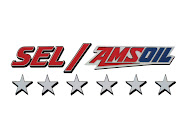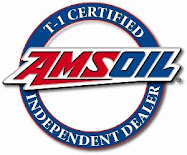AMSOIL Dominator® Coolant Boost
Provides Effective Heat Transfer and Enhanced Corrosion Protection!
Racers demand lower engine operating temperatures in order to achieve maximum efficiency and horsepower on the track, while the straight water coolant used by many racers opens engines up to damaging radiator and water pump corrosion. AMSOIL Dominator® Coolant Boost (RDCB) provides racers and motorists with significantly lower engine operating temperatures, quicker engine warm-up times and advanced corrosion protection.
Dominator Coolant Boost is formulated with proprietary tiered surfactant technology, providing quick and effective heat transfer inside radiators and cylinder heads, which results in reduced operating temperatures, more efficient operation, increased horsepower and significantly reduced engine warm-up times in cold weather. Coolant Boost also contains a robust mixture of corrosion inhibitors that protect the radiator, heater core, water pump, cylinder heads, engine block and intake manifold from the damaging effects of corrosion.
Temperature Reduction Dynamometer Test
To test the temperature reduction capabilities of Dominator Coolant Boost, dyno tests were performed on a Chevy 350 cubic inch engine with an aluminum block and cylinder heads. Running the test with both straight water and water treated with Coolant Boost, the engine was operated at 4,500 rpm until coolant temperature stabilized.
COOLANT MIXTURE STABILIZED COOLANT TEMPERATURE
Straight Water 221°F
Water with Coolant Boost 202°F
Test results show water treated with Coolant Boost provided a 19°F temperature reduction.
Aluminum Corrosion Test
The Aluminum Corrosion Test (ASTM D-4340) measures the corrosion protection properties of Dominator Coolant Boost in modern automobile and high-performance race engines with aluminum cylinder heads. A cast aluminum puck was heated to 275°F at 28 PSI and exposed to the test coolant mixture for one week. Weight loss of less than 1.0 mg is required to pass the test.
COOLANT MIXTURE WEIGHT LOSS
Straight Water 3.97 mg/cm2/wk
Water with Coolant Boost 0.14 mg/cm2/wk
Test results show water treated with Coolant Boost easily passed the Aluminum Corrosion Test.
Metal Corrosion Test
The Metal Corrosion Test (ASTM D-2570) measures corrosion protection properties in automotive cooling systems. Using ASTM corrosive water designed to simulate hard and corrosive water in degraded coolant, six metal coupons constructed of the most common metals in automotive cooling systems were exposed to the test coolant mixture at 190°F. The coolant was maintained at a temperature and flow rate equivalent to the operating conditions seen in most passenger vehicles. Corrosive weight loss suffered during the test determines the additive’s corrosion protection properties.
Recommendations
Dominator Coolant Boost is recommended with both racing applications using straight water coolant and automotive applications using 50/50 coolant/water mixtures.
Directions: With engine off and cool, make sure cooling system is filled with selected coolant. Shake bottle and pour calculated amount of Coolant Boost into radiator. Start engine, turn heat on high and run for 15 minutes. Do NOT use distilled water unless mixed with 50% antifreeze.
Dosage: For straight water applications, add 2 fl. oz. of Coolant Boost per quart of tap or softened water. For 50/50 coolant/water applications, add 1 fl . oz. of Coolant Boost per quart of 50/50 mix.
Frequency: In applications using Coolant Boost with straight water, drain and re-fill the coolant system and add Coolant Boost once per year or when indicated by color change. A distinctive pH color change indicates when the pH has fallen to a point where corrosion can set in. When the Coolant Boost/water mixture changes from pink to clear, another dosage of Coolant Boost should be added. Monitoring the pH level will ensure all vital areas of the cooling system are protected against corrosion.
In applications using Coolant Boost with 50/50 coolant/water mixtures, add Coolant Boost once per year or every 30,000 miles, whichever comes first. Follow coolant manufacturer recommendations for coolant change intervals
skip to main |
skip to sidebar


AMSOIL DEALERS WANTED - $30
AMSOIL products are sold through independent Dealers. People like you. People who want extra money, something to do in ...
Make Money With Oil
- Make Money With Oil
- AMSOIL Preferred Customer-SAVE!
- AMSOIL Dealer Information Request
- FREE Retail or Commercial Account
- AMSOIL Online Store
- AMSOIL Online Application Guide
- AMSOIL PowerSports Filters
- AMSOIL Ea Air Filters
- AMSOIL Fuel Additives
- TRICO Wiper Blades
- AMSOIL Ea Oil Filters
- NGK Plugs & Wire Sets
- AMSOIL Antifreeze
- AMSOIL Protectants
- AMSOIL Engine Flush Cleaners and Degreasers
- AMSOIL Synthetic Grease
- AMSOIL Synthetic Compressor Oil
- AMSOIL Synthetic Suspension Fluid
- AMSOIL Synthetic Power Steering Fluid
- AMSOIL High Performance Brake Fluid
- AMSOIL Synthetic Hydraulic Oil
- AMSOIL Synthetic Racing Gear Lube
- AMSOIL Synthetic Gear Lubricants
- AMSOIL Synthetic 4-Stroke Oil
- AMSOIL Synthetic 2-Cycle Oil
- AMSOIL Synthetic Motorcycle Oil
- AMSOIL Synthetic Diesel Oil
- AMSOIL Synthetic Racing Oil
- AMSOIL Synthetic Motor Oil
- AMSOIL Online Product Catalog
- AMSOIL Products by Category
- Checkered Flag - AMSOIL Racing Reports
- AMSOIL Race Teams, Series and Events
About Me
- Joe Petrey - AMSOIL Dealer
- Becoming your own Boss has never been easier! You can start your dealership for as little as $30. For more information please call AMSOIL Joe at 218-349-9447
AMSOIL DEALERS WANTED
AMSOIL DEALERS WANTED - $30
AMSOIL products are sold through independent Dealers. People like you. People who want extra money, something to do in ...










